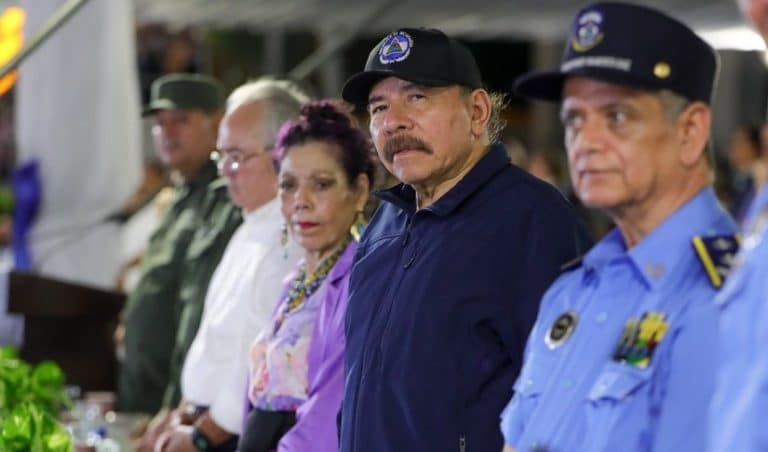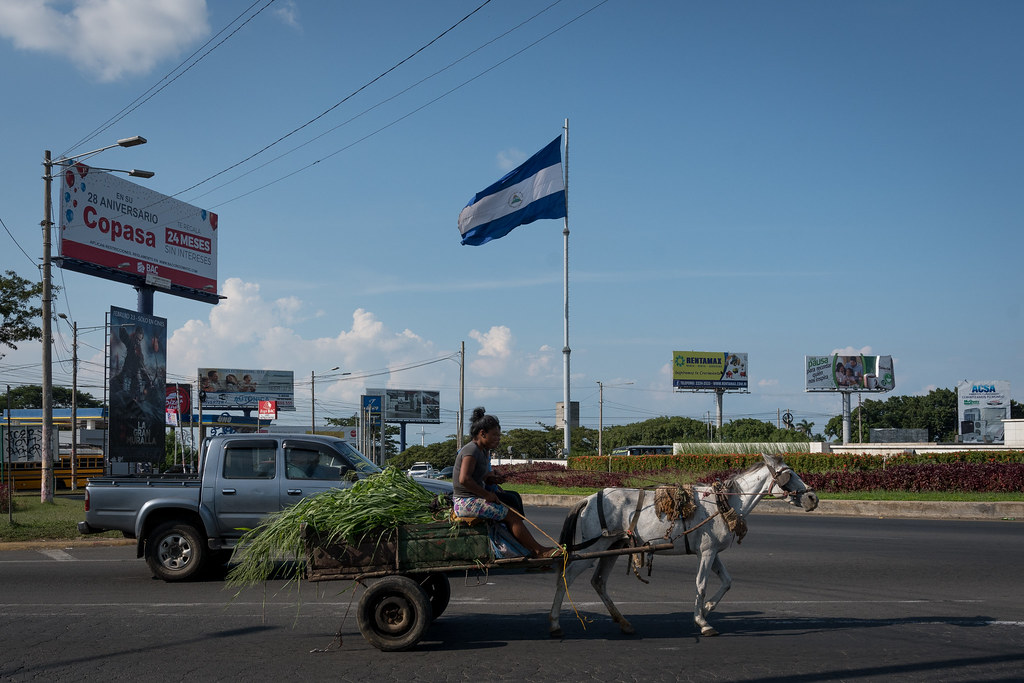5 de febrero 2024

“NicaraguAmor” Cultural Caravan for Nicaraguans in the USA

PUBLICIDAD 1M
PUBLICIDAD 4D
PUBLICIDAD 5D
Luciana Torchiaro, TI advisor: “The concentration of power in Ortega and Murillo is brutal, there is extreme opacity, corruption is not punished"

Daniel Ortega and Rosario Murillo watch a parade for the 44th anniversary of the Police. Photo: Presidency
In the Corruption Perceptions Index produced by Transparency International, after applying the same indicators to 180 countries worldwide, the regime of Daniel Ortega and Rosario Murillo appears among the most corrupt. Nicaragua ranks second in Latin America, surpassed only by the dictatorship of Nicolas Maduro in Venezuela.
Luciana Torchiaro, the Transparency International advisor for Latin America, explains that according to this index, based on 13 international sources around three governance indicators – transparency, and impunity, “public corruption in Nicaragua is alarming, the concentration of power is brutal, and abuses of corruption are not sanctioned.”
In an interview with “Esta Semana” and “CONFIDENCIAL,” Torchiaro mentioned her surprise at reports like that of the International Monetary Fund, suggesting progress in public information access and the oversight role of Nicaragua’s Comptroller’s office. “Our indicators tell us the opposite. On a scale of 0 to 100, Nicaragua scores 17 points, where 100 is clean, and zero is considered very corrupt. Also, according to our reports, the shielding around Ortega and Murillo is extremely opaque, allowing them essentially a free hand to do as they please.”
In Transparency International’s latest report on the Global Corruption Perception Index, involving 180 countries, Venezuela ranks second as the most corrupt, only preceded by Somalia, with Nicaragua in the fourth position among the most corrupt. What does this data mean?
It indicates that the situation in these countries is alarming. They are below countries that have been facing civil wars for many decades and have no functioning state. The particularity here is that we are dealing with two dictatorships, two countries where there is extreme opacity, with no checks or balances to power. Instead, power is concentrated in the executive and political and economic elites governing the country. In both cases, there are also links to organized crime.
How many years have Nicaragua and Venezuela been in this range, among the most corrupt countries?
In the Latin American context, for many years, and in the case of Venezuela, which has been under the Chavista dictatorship for so long, it has also ranked at the bottom of our international ranking for several years.
How is this corruption index calculated by Transparency International? Is it based on surveys of citizens, entrepreneurs, international organizations, or studies?
This index is a compilation of 13 sources, three indicators from highly reputable international organizations that measure democracy, governance levels, bribery levels, and transparency in different countries. At Transparency International, we compile and generate a score, and our index is the most widely used tool internationally by academia, risk assessment companies, international organizations, and businesses when making investment decisions to measure a country’s corruption context.

In the case of Nicaragua, this index contrasts with a recent report from the International Monetary Fund, which even praised supposed advances in public information access in Nicaragua, and progress in the work of the Comptroller. How can the stark contrast between these two reports be explained in a country under press censorship?
I am particularly struck by a report that claims the country has improved in terms of transparency because our indicators tell us the opposite. We are talking about a country that, on a scale of 0 to 100, scores 17 points, where 100 is clean, and zero is considered very corrupt. Also, according to our reports, the concentration of power, the shielding around Ortega and Murillo, is extremely opaque. The concentration of power is brutal, allowing them essentially a free hand to do whatever they want. We are talking about a country where critical voices are silenced to the maximum, where there is no freedom of the press, no freedom of expression, no freedom of access to information. It is very difficult for such a country to get a good score in our index.
In Nicaragua, citizens and business people complain about tax extortion, property confiscations, corruption in public contracts, and a lack of legal security. Does the report specify the main types of corruption in Nicaragua or document any specific cases?
No, our report observes different indicators: transparency level, access to information, governance conditions, the context of exercising fundamental rights – which are the same as mentioned before – the quality of a country’s governance space. So, what we do is add sources; we do not take specific cases. What does happen is that the perception of our sources, who are expert analysts, often reflects that as more corruption cases come to light, it can impact how analysts view a country’s corruption level.
But it does mention impunity. How is impunity measured?
Impunity means that there is no punishment for corruption and those committing abuses. In our region, impunity levels are very high, meaning corrupt and criminal individuals, even those amid legal processes, do not receive a sentence. It is very difficult for the corrupt to receive a firm and proportional sentence for their actions.
This year, we are linking this issue with the lack of independence of the judiciary. In many countries, the judiciary responds to the current governments or the economic and political elites that co-opt this power, prosecutors, and judges, to implement the law according to their interests or to shield themselves, that is, to obtain impunity.
Who are the main users of this corruption index, or conversely, of lack of transparency?
This report is undoubtedly a reference point because it is the only one that measures corruption perception in 180 countries. The geographical level we cover is not covered by other instruments, and it has many years of experience.
The first time this index was published was in 1995. We can also make comparisons over time; from 2012 to the present we can compare. For this reason, the index is used by companies, investors, entities that assess risk, international organizations, academia, and it is the most cited by journalists. In other words, it is a reference tool for political and economic analysts worldwide.
What does a high degree of corruption mean for the use of public resources? What is the economic cost of corruption or efficiency in resource allocation?
The economic cost of corruption is extremely high in terms of a country’s development. The money that is diverted, disappears, ends up in a tax haven. It is money that is not invested in the country. It is infrastructure that is not built, schools that are not constructed, hospitals that are abandoned or dismantled.
This has a very significant impact on people’s daily lives, a very important impact on a country’s development level. Corruption is also a trigger for poverty because the humblest people, with more needs, are the ones with the least opportunities and the most needs to make use of these public resources. Likewise, the redistributive policies that a state may have.
The report also mentions other Central American countries, particularly Honduras and Guatemala, noting weaknesses in their judicial systems. Can it be said that these countries also have a high level of corruption?
Of course, yes. Both countries have serious corruption levels, both have scores well below the regional average, which is already very low at 43. In these countries, we have observed a regression, a restriction of civic space, freedom of the press, freedom of expression in recent times. We have also observed an increasing concentration of power in the executive branches and a co-optation of the judicial system. Therefore, there are no sentences for corruption cases.
In Guatemala, we have seen in recent years how the judiciary and the Public Ministry, have been instruments used by the government to persecute prosecutors who were doing their job well, as well as journalists, NGOs, and individuals who were exercising their duty or activism demanding accountability from the government.
In contrast to the situation in these countries, the report places Uruguay, Chile, and Costa Rica in the top positions for transparency. Still, these countries also have corruption scandals. What sets these three countries apart from the rest of Latin America?
No country is immune to corruption. Neither Uruguay, nor Chile, nor Costa Rica, nor the Scandinavian countries in Europe, all countries can suffer from corruption. The difference in these three Latin American countries is that they have stronger democracies; the systems of checks and balances work, there is a balance of power, there are channels for citizen participation, citizens can participate in public decisions, there is no political persecution, no reprisals, or at least much less, and the judiciary is more independent. Nevertheless, they are not immune to corruption, but they are much better equipped to address this problem.
The report highlights the Dominican Republic as the country in Latin America that has improved its position the most in the Corruption Perception Index. What is the cause? What has the Dominican Republic done?
The Dominican Republic has taken transparency and strengthening the judiciary very seriously. It is the only country in recent years that has shown progress in our index. This is precisely because they are building an independent judiciary that is investigating without interference, even corruption cases involving high-profile individuals. They are also moving towards a transparent, state-of-the-art procurement and contracting system. All these factors contribute to this country showing progress. There is still more to be done, of course, and we hope they continue on this path, but these are the decisive factors that allow significant changes to be shown.
In the absence of public institutions exercising control and oversight functions or a judiciary that punishes corruption, can independent press and citizen denunciation fill that void? People say you can file complaints, but no one punishes corruption…
In any case, it is very important to confront the situation. Staying firm is risky, we know that. There is also a lot of opportunity from abroad, with international figures working and exerting pressure in these countries. We also have international sanction mechanisms that can be used to achieve justice when justice in a country is completely co-opted. But undoubtedly, everything the press can do from abroad is very important to unveil what is happening in the country and to report with data that is not manipulated but real. The work of journalism is very important.
This article was published in Spanish in Confidencial and translated by Havana Times. To get the most relevant news from our English coverage delivered straight to your inbox, subscribe to The Dispatch.
PUBLICIDAD 3M
Periodista nicaragüense, exiliado en Costa Rica. Fundador y director de Confidencial y Esta Semana. Miembro del Consejo Rector de la Fundación Gabo. Ha sido Knight Fellow en la Universidad de Stanford (1997-1998) y profesor visitante en la Maestría de Periodismo de la Universidad de Berkeley, California (1998-1999). En mayo 2009, obtuvo el Premio a la Libertad de Expresión en Iberoamérica, de Casa América Cataluña (España). En octubre de 2010 recibió el Premio Maria Moors Cabot de la Escuela de Periodismo de la Universidad de Columbia en Nueva York. En 2021 obtuvo el Premio Ortega y Gasset por su trayectoria periodística.
PUBLICIDAD 3D